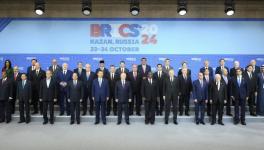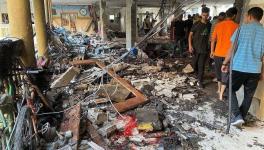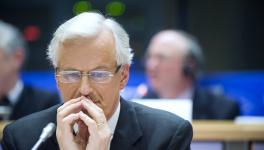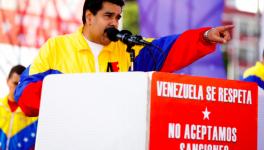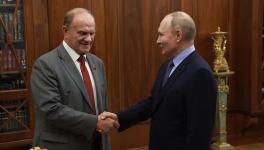Why France is Challenging Russian Peacekeeping in Caucasus
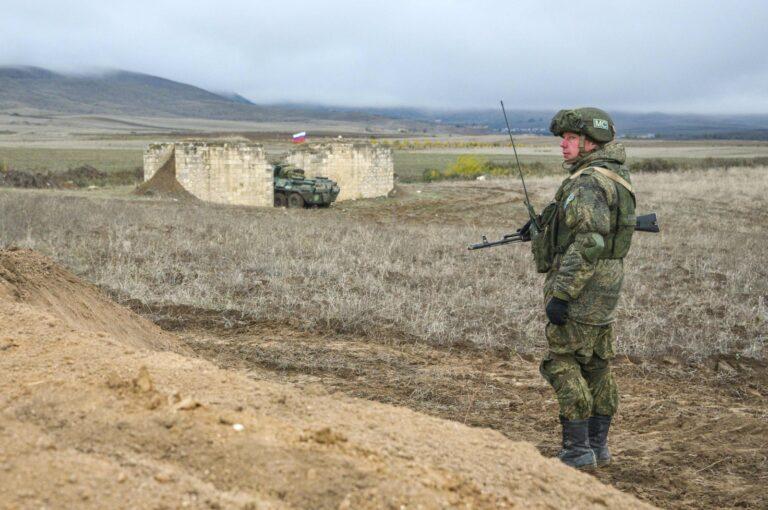
A Russian peacekeeper patrols at checkpoint outside Askeran, Nagorno-Karabakh, November 19, 2020. (AFP Photo)
The trilateral agreement on November 10 between Armenia, Azerbaijan and Russia over Nagorno-Karabakh is leading to a geopolitical struggle in the Caucasus. So long as Armenia and Azerbaijan were ferociously fighting, the great game lurked in the shade.
But no sooner than the seven-week old conflict reached a climax — capture of Shusha by Azeri forces and Armenia facing imminent rout — Moscow stepped in to mediate a truce in real time.
The speed with which Russian President Vladimir Putin moved and his hands-on role in knocking the Armenian and Azeri heads together through night-long negotiations was absolutely stunning. It took the region and the international community by surprise.
Putin’s mediation inevitably led to Russian peacekeeping. By the time the world came to know of the truce in the wee hours of November 10, Russian military contingents were already en route to Nagorno-Karabakh.
The French President Emmanuel Macron has egg on his face. He had fancied himself to be the charioteer in the Caucasus ever since conflict erupted in late September. Of course, the Armenian Diaspora in France constitutes an influential constituency in French politics.
On November 7, Macron had called Putin and discussed the “ongoing large-scale hostilities” in Nagorno-Karabakh and reached a “mutual commitment to continued coordinated mediation efforts by Russia and France, including as part of the OSCE Minsk Group.”
Next he knew, as he woke up at Elysee Palace three days later, was that Russian peacekeeping forces were landing in Nagorno-Karabakh. And, to rub salt into Macron’s bruised ego, it was only six days thereafter that Putin remembered to call Macron (on November 16) — “considering that Russia and France are co-chairs of the OSCE Minsk Group,” as the Kremlin readout put it.
Putin filled in Macron with the flow of events and informed Macron that “the general situation in the region has stabilised.” Here was Macron, all dressed up and raring to perform a high octane diplomatic role in the Caucasus when Putin called him to say the war got over a week ago and it was time now to turn to the unappetising residual issues concerning “urgent humanitarian issues, including returning refugees to their permanent homes, ensuring normal living conditions for the population, restoring the infrastructure, and preserving Christian temples and monasteries.”
Macron couldn’t take it anymore. The French Foreign Minister Jean-Yves Le Drian was ordered to urge Moscow publicly that it should clear up the “ambiguities” over the ceasefire, notably regarding the role of Turkey and foreign fighters. He told the French National Assembly, “We must remove the ambiguities over refugees, the delimitation of the ceasefire, the presence of Turkey, the return of fighters and on the start of negotiations on the status of Nagorno-Karabakh.”
To be sure, France coordinated with the US (both are co-chairs of the Minsk Group). Within hours of the French FM’s statement, the US State Department waded into the topic. While welcoming the cessation of hostilities, the US statement ignored Moscow’s mediatory role. It said,
“Ending the recent fighting is only the first step toward achieving a peaceful, negotiated settlement of the Nagorno-Karabakh conflict. We urge the sides to re-engage as soon as possible with the Organization for Security and Cooperation in Europe (OSCE) Minsk Group Co-Chairs to pursue a lasting and sustainable political solution to the Nagorno-Karabakh conflict based on the Helsinki Final Act principles of the non-use or threat of force, territorial integrity, and the self-determination and equal rights of peoples. As a Co-Chair of the OSCE Minsk Group, the United States remains fully engaged in this effort.”
Plainly put, both France and the US insist that Russia cannot act unilaterally but only through the Minsk Group. Yesterday, the French presidency called for international supervision to implement the cease-fire. “We want the Minsk Group to play its role in defining the surveillance (of the cease-fire),” an official in Macron’s office said.
The French official rebuked the Kremlin: “We understand that the Russians are talking to the Turks regarding a possible formula, which we don’t want, that would replicate the Astana process (on Syria) to divide their roles in this sensitive region. We can’t have on one side Minsk (Group) and the other Astana (process on Syria). At one point the Russians have to make a choice.”
Clearly, France (and the US) fear that that Russia and Turkey have cut a deal to keep out Western powers from future peace talks. Indeed, the Astana forum enabled Russia and Turkey to discuss between themselves how to handle the Syrian conflict and marginalised the Western powers. To add insult to injury, like in Syria, Russia also has a deal with Turkey on the deployment of the latter’s military personnel in Azerbaijan.
The western expectation was that Russia and Turkey would fall out over Nagorno-Karabakh, but the opposite has happened. They have blocked the western powers from getting involved. Both Turkey and Russia have strained relations with the US; Macron and Turkish President Recep Erdogan are confronting each other on multiple fronts ranging from Libya to Syria to France’s predicament with “Islamist terrorism”. Recently, Erdogan proposed psychiatric counselling for Macron.
Putin and Erdogan would have a congruence of interest to cement the November 10 peace deal before the Joe Biden presidency sails into view. Biden has harshly referred to Erdogan and Putin. In the final analysis, though, Nagorno-Karabakh highlights a serious fracture in the western alliance system: one NATO power (Turkey) has aligned with the alliance’s existential enemy (Russia) to humiliate and marginalise two major allies (the US and France). The Minsk Group consists of two other NATO members also — Germany and Italy.
Russia and Turkey are unlikely to get back into the Minsk Group. Neither country wants the western powers to get a habitation in Caucasus. Russia, perhaps, has more to lose than Turkey, since Azerbaijan and Georgia also border North Caucasus, a volatile region with majority Muslim population, and Azerbaijan is also a littoral state of the Caspian Sea, where Moscow is determined to preserve security primacy and constrain other external powers that can impede its influence, especially the US and NATO.
In Georgia, the US has consolidated a strategic presence. The US is committed to helping Georgia deepen its Euro-Atlantic ties and supports Georgia’s NATO aspirations. Curiously, in a signal to Moscow, the outgoing US Secretary of State Mike Pompeo visited Georgia on November 18.
At the end of the day, Russia-Turkey coordination in Nagorno-Karabakh remains tactical. But it is with Iran that Russia a robust understanding over Nagorno-Karabakh. The November 10 peace accord is based on Iran’s peace plan and Tehran feels gratified that Moscow opted for the “Astana format”.
Iran’s Foreign Minister Javad Zarif is travelling to Moscow and Baku on November 23-24. Iran is well placed to supplement Russian diplomacy to give traction to the peace agreement, since it has friendly ties with both Armenia and Azerbaijan (and Georgia.) Reports suggest that western powers have been hyperactive in Baku and Yerevan to subvert the peace plan.
Get the latest reports & analysis with people's perspective on Protests, movements & deep analytical videos, discussions of the current affairs in your Telegram app. Subscribe to NewsClick's Telegram channel & get Real-Time updates on stories, as they get published on our website.









